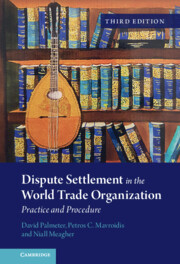Book contents
- Dispute Settlement in the World Trade Organization
- Dispute Settlement in the World Trade Organization
- Copyright page
- Epigraph
- Contents
- Preface
- 1 Overview
- 2 Jurisdiction
- 3 Sources of Law
- 4 Consultations and the Panel Process
- 5 Special Rules and Procedures
- 6 Evidence and Proof
- 7 The Appellate Process
- 8 Adoption and Implementation of Reports
- 9 Remedies
- 10 Conclusion
- Book part
- Bibliography
- Index
9 - Remedies
Published online by Cambridge University Press: 27 January 2022
- Dispute Settlement in the World Trade Organization
- Dispute Settlement in the World Trade Organization
- Copyright page
- Epigraph
- Contents
- Preface
- 1 Overview
- 2 Jurisdiction
- 3 Sources of Law
- 4 Consultations and the Panel Process
- 5 Special Rules and Procedures
- 6 Evidence and Proof
- 7 The Appellate Process
- 8 Adoption and Implementation of Reports
- 9 Remedies
- 10 Conclusion
- Book part
- Bibliography
- Index
Summary
This chapter discusses the remedies that are available under WTO law. It explains that the preferred solution to a dispute is a mutually agreed solution. If this is not possible, and the defending party does not implement any adverse rulings, the defending party may offer compensation (in the form of equivalent trade concessions). The last and least desirable option is retaliation, or the suspension of concessions. The chapter explains the procedures for each of these possible remedies, with a particular focus on the arbitration under Article 22.6 of the DSU of the amount of retaliation proposed by the complaining party. The chapter also discusses the “sequencing” problem arising out of the deadlines to request the right to retaliate in the DSU. Finally, the chapter discusses the special rules governing disputes over subsidies and the role played by suggestions by the panel and Appellate Body on implementation.
Keywords
- Type
- Chapter
- Information
- Dispute Settlement in the World Trade OrganizationPractice and Procedure, pp. 457 - 517Publisher: Cambridge University PressPrint publication year: 2022



